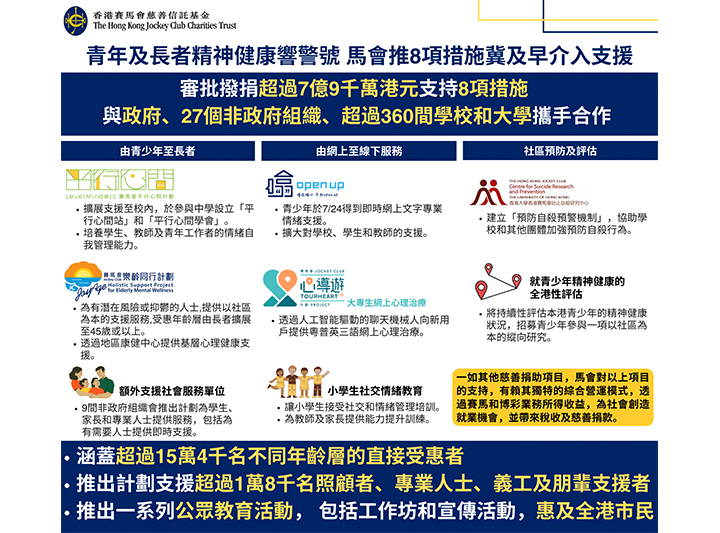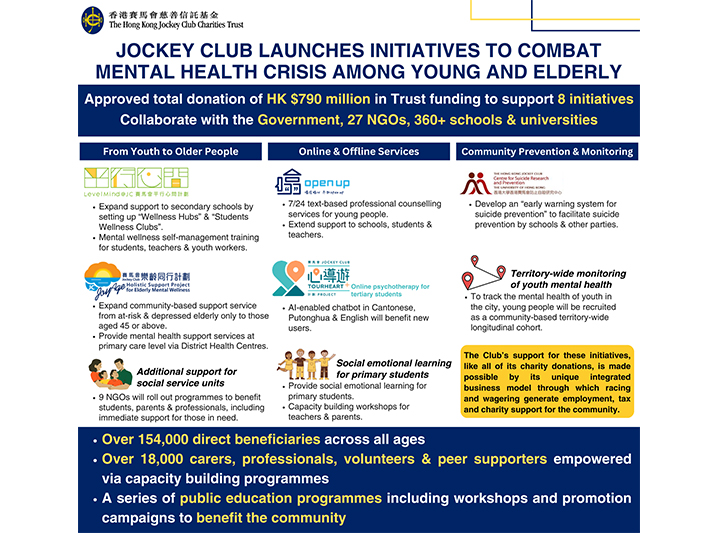

Charities & Community
All Categories
Jockey Club launches initiatives to combat mental health crisis among young and elderly
23/02/2024
Hong Kong is facing a mental health crisis. The COVID-19 pandemic, as well as socio-economic pressures, have raised stress levels across the community. The situation is most critical among the young and the elderly. According to a survey, 2.8 per cent of Hong Kong students said they had suicidal thoughts in the 2022/23 academic year. For the elderly, deteriorating health coupled with loneliness and bereavement leaves them at greater risk of depression and suicide.
Responding to this urgent need in our community, The Hong Kong Jockey Club Charities Trust has approved HK$790 million to fund eight mental health initiatives. Specifically, they will target the needs of young people and Hong Kong’s growing population of elderly.
Outlining the Club’s donation at a press conference today (23 February), Club Steward Lester Huang explained that the Club is adopting a multi-pronged approach to address these metal health challenges. Working with the government, non-governmental organisations (NGOs), social service units, schools and academia, the eight initiatives will provide both online and offline emotional support at the primary care, school and community levels. Territory-wide monitoring will also be carried out to measure impact. The initiatives are expected to support more than 154,000 people.
Guests attending the press conference sharing session included Dr Lam Ching-choi, Chairman of the Advisory Committee on Mental Health; Dr Donald Li, Chairman of the Elderly Commission and Convenor of the Advisory Committee of JC JoyAge; and Kwan Chuk-fai, Chairman of the Community Investment & Inclusion Fund Committee and Convenor of the Advisory Committee of LevelMind@JC.
Dr Lam said that many mental health problems can be prevented and he called for a collaborative effort among families, schools and the community to implement preventive measures at all levels.
On elderly mental health, Dr Li said there is a need to build synergy between medical and social services so as to enhance community support and strengthen the overall resilience of older adults. In particular, the new phase of JC JoyAge will promote mental health at the primary care level through partnering with District Health Centres.
Discussing youth mental health, Mr. Kwan said that the public stigma surrounding mental health, along with the non-youth-oriented and fragmented nature of services, makes it difficult for young people to open up and find the support they need. To address the mental health crisis and establish a sustainable support system, it is crucial for relevant services to adopt a youth-centric perspective, providing accessible and one-stop assistance. Empowering young people with mental health self-management skills, nurturing their interests, and setting developmental goals are also vital.
The eight initiatives supported by the Club are as follows, with specific details to be announced in due course.
From Young to Older People
Expansion and scaling up of LevelMind@JC Expansion of JC JoyAge to provide mental health support to a wider age range via District Health Centres Additional support for social service units |
Online and Offline Services
Enhancement and expansion of Jockey Club Online Youth Emotional Support “Open Up” Online psychotherapy for tertiary students Social emotional learning for primary students |
Community Prevention and Monitoring
Early warning system for suicide prevention Territory-wide impact monitoring of youth mental health |
The Club’s support for these mental health initiatives, like all its charity donations, is made possible by its unique integrated business model through which racing and wagering generate employment, tax and charity support for the community.





